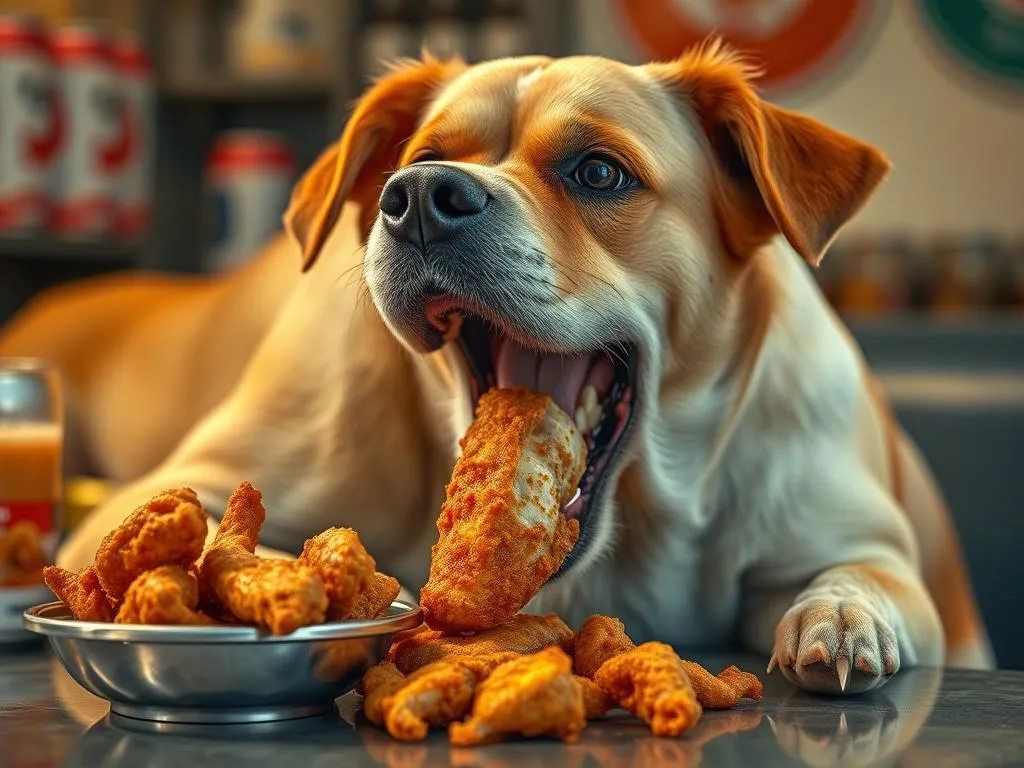
Introduction
Dog nutrition plays a crucial role in ensuring the overall health and well-being of our canine companions. Just like humans, dogs require a balanced diet that meets their specific needs, which can vary significantly based on factors such as age, size, breed, and health status. As dog owners, we often find ourselves sharing our meals with our furry friends, leading to questions about which human foods are safe for dogs. One common query is, can dogs eat fried chicken? Understanding this topic is essential for responsible pet ownership and maintaining a dog’s health.
In this article, we aim to provide a comprehensive understanding of dog nutrition, focusing particularly on fried chicken. We will explore the nutritional needs of dogs, the ingredients in fried chicken, the associated risks, and healthier alternatives that ensure our pets thrive.
Understanding Dog Nutrition
Nutritional Needs of Dogs
Every dog has specific nutritional requirements that need to be met for optimal health. These requirements generally include:
- Proteins: Essential for growth, tissue repair, and overall maintenance of body functions.
- Fats: Provide energy and support cell structure. They are also vital for the absorption of fat-soluble vitamins (A, D, E, and K).
- Carbohydrates: While not strictly necessary, carbohydrates can provide energy and aid in digestion.
- Vitamins and Minerals: Crucial for various metabolic processes, immune function, and overall health.
The nutritional needs of dogs can vary significantly based on their age (puppies require more protein for growth compared to adult dogs), size (larger breeds may need different nutrients than smaller breeds), and health status (dogs with specific conditions may require specialized diets).
Common Dog Food Ingredients
When it comes to commercial dog food, understanding ingredients is key. Many dog foods contain a mix of high-quality ingredients and fillers. High-quality ingredients—such as real meats, vegetables, and whole grains—are essential for a balanced diet. In contrast, fillers (like corn and soy) may provide little nutritional value and can contribute to health issues.
Risks of Improper Nutrition
Feeding dogs an improper diet can have serious consequences, leading to issues such as obesity, diabetes, and digestive problems. Furthermore, many misconceptions surround dog diets, such as the belief that dogs can thrive solely on a meat-based diet or that certain human foods are harmless. Educating ourselves about proper nutrition is vital to avoid these pitfalls.
Can Dogs Eat Fried Chicken?
Ingredients in Fried Chicken
To answer the question, can dogs eat fried chicken, we first need to examine its ingredients. Fried chicken typically consists of:
- Breaded Coating: Often contains flour, breadcrumbs, and various seasonings.
- Oil: Used for frying, which can be high in unhealthy fats.
- Seasonings: Common spices that can be harmful, such as garlic and onion, which are toxic to dogs.
Nutritional Value of Fried Chicken for Dogs
Fried chicken does offer some nutritional benefits, particularly with its high protein content. However, it also contains unhealthy fats and high sodium levels, making it less than ideal for dogs. Compared to healthier protein options, fried chicken may lack essential nutrients and introduce harmful elements into a dog’s diet.
Risks and Considerations
Feeding dogs fried chicken poses several health risks, including:
- High Fat Content: Fried foods can lead to pancreatitis, a painful condition caused by inflammation of the pancreas.
- Sodium Levels: Excessive sodium can lead to dehydration and other health issues.
- Bones: Cooked chicken bones can splinter, posing a choking hazard and leading to internal injuries.
It’s essential to be aware of these risks if considering fried chicken as a treat for dogs.
Signs of Adverse Reactions
If a dog consumes fried chicken, it’s important to monitor them for adverse reactions. Symptoms may include:
- Vomiting
- Diarrhea
- Lethargy
- Abdominal pain
If any of these signs occur, it is advisable to contact a veterinarian for guidance.
Healthier Alternatives to Fried Chicken
Safe Chicken Preparations
Instead of fried chicken, consider offering your dog plain, boiled, or baked chicken without any additives or seasoning. This method ensures that the chicken is safe and nutritious for your pet. Here are some safe cooking methods:
- Boiling: Ensures the chicken is cooked thoroughly without added fats.
- Baking: Allows for a crispy texture without oil.
- Grilling: Can add flavor without unhealthy fats, as long as it’s plain.
Alternative Protein Sources
In addition to chicken, there are several other protein sources that are safe and nutritious for dogs. Some options include:
- Turkey: Lean and similar in nutritional value to chicken.
- Fish: Rich in omega-3 fatty acids, beneficial for skin and coat health.
- Legumes: Such as lentils and chickpeas, which provide plant-based protein and fiber.
Incorporating a variety of protein sources into a dog’s diet can enhance their overall nutrition and health.
How to Incorporate Human Foods into a Dog’s Diet
Guidelines for Feeding Human Foods
If you want to share human food with your dog, it’s essential to do so thoughtfully. Here are some general guidelines:
- Start Small: Introduce new foods gradually to monitor for any adverse reactions.
- Moderation: Human foods should only make up a small portion of a dog’s overall diet.
- Balance: Ensure that treats do not replace balanced dog food.
Foods to Avoid
Certain human foods are toxic or harmful to dogs and should be avoided at all costs. Common examples include:
- Chocolate: Can cause severe toxicity and even death.
- Grapes and Raisins: Known to cause kidney failure.
- Onions and Garlic: Can damage red blood cells.
It’s crucial to be aware of these foods and their potential dangers to protect your furry friend.
Consulting with Veterinarians
Importance of Professional Guidance
When it comes to your dog’s diet, consulting with a veterinarian is invaluable. They can provide personalized recommendations based on your dog’s unique needs, ensuring they receive the right nutrients for their health and happiness.
Regular Health Check-ups
Regular veterinary check-ups are essential for monitoring your dog’s health and nutritional needs. As dogs age or develop health conditions, their dietary requirements may change. Routine visits help ensure that your pet remains healthy and receives appropriate dietary adjustments.
Conclusion
In conclusion, understanding dog nutrition is critical for every pet owner, especially when it comes to the question, can dogs eat fried chicken? While fried chicken may seem tempting, the associated risks often outweigh the benefits. Instead, prioritize a balanced diet using safe and healthy food options. Always consult with a veterinarian to make informed choices about your dog’s nutrition and well-being. By doing so, you can ensure that your furry companion lives a happy, healthy life.









